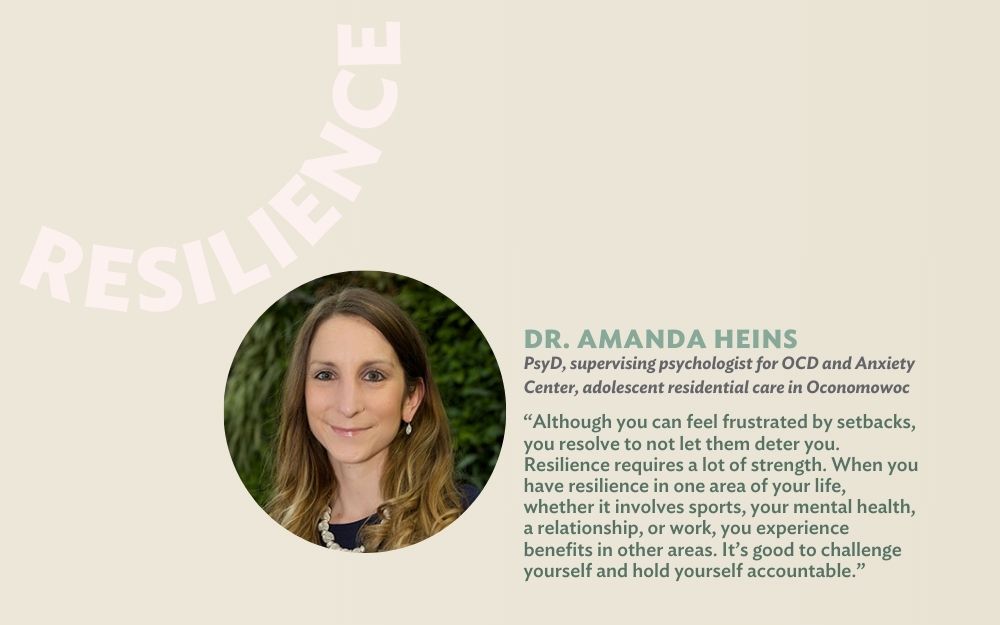By: Amanda Heins, PsyD, supervising psychologist for OCD and Anxiety Center, adolescent residential care in Oconomowoc
What is resilience?
When I think of resilience, I think of grit. It’s leaning into something that you’re working toward, persevering and pushing through challenges because of how much you value what could be in store. Although you can feel frustrated by setbacks, you resolve to not let them deter you. Resilience requires a lot of strength. When you have resilience in one area of your life, whether it involves sports, your mental health, a relationship, or work, you experience benefits in other areas. It’s good to challenge yourself and hold yourself accountable.
Resilience shouldn’t compromise your values. It isn’t doing the same thing over and over if you’re getting the same result. Resilience means trying to look at things with a more balanced perspective, considering whatever you may have learned from past difficulties and putting that into practice, which requires having humility and vulnerability. Ask why is this something that I’m working on? Why is this important to me right now in the scheme of things? What do I hope to accomplish? Is this worth the time and energy? If you discover a red flag of what’s driving you to continue, I recommend asking whether it’s truly resilience, or could it be fixation or perfectionism which is taking away from other things that you value, like relationships or hobbies? Not honoring commitments, especially without adequate communication, can have ripple effects and cause strain within relationships.
How do I build resilience?
Since resilience is usually connected to change, I recommend starting with self-reflection to set SMART goals:
- S – specific: Clearly define what it is you want to achieve.
- M – measurable: Establish a way to determine if you’ve met your goal with a tangible metric.
- A – appealing: Pursue a goal that interests you.
- R – realistic: Make sure your goal is achievable.
- T – time bound: Ensure you have enough time to achieve your goal.
Remember that with all change, it’s usually not a matter of if you’ll face challenges, but when. Think about what those could be and try to come up with a game plan to prepare for them as best you can. When facing a roadblock, embrace it. Consider what’s prompting the barrier and determine whether it’s an opportunity to possibly reframe your goal or break it down into more manageable chunks. Also, it’s important to celebrate your successes, no matter how small the win is. Recognizing the steps that you’re taking every day to achieve your goals builds resilience and keeps you invested and motivated to get to the finish line.
How does Rogers help patients build resilience?
At Rogers, we do a lot of insight-oriented work. As our patients are engaged in treatment, there are of a lot of things that naturally happen throughout their day. We work with them to maximize those moments because they’re absolutely connected to why they’re here. An example is a child who has social anxiety and wants to isolate in their room at the OCD and Anxiety Center. When they come out of their room, someone asks them a question, and maybe they get tongue tied or they don’t say anything and just freeze. If I or another member of my teams sees that, we’re going to meet with that person and say, “Let’s talk about what you just did. You decided you were going to limit your worry thoughts. You took charge and you got up on all on your own and came out of your room. Then you had a curveball when someone engaged with you. Why did they engage with you? They’re curious about you and they want to get to know you. They want to connect with you and that’s a positive thing.” We then work with that patient to build the confidence of how to chat with someone by creating goals and helping them recognize the wins.
Rogers provides mental health treatment for children, adolescents, and adults
If you or a loved one is struggling with addiction, eating disorders, OCD and anxiety, depression or other mood disorder, or trauma (PTSD), we have compassionate teams ready to help in a growing network of communities nationwide. Call 800-767-4411 for a free, confidential screening.


